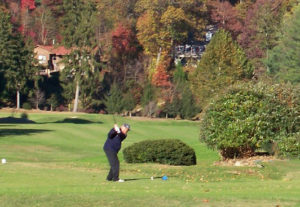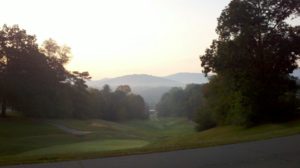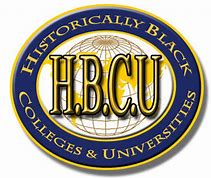Minority Golf Magazine presents the first of a series of articles on golf courses around the country where minorities played and developed their games. We begin with an overview of several that we will detail in coming issues and we highlight the Skyview Golf Tournament in Asheville, NC, The Ashville Municiple Golf Course.
The winner of the pro division last year was Phil Nichols, Mr. Gardenhight told MGM that 2018 was the lowest turnout in many years but he at 83 years young is encouraged and looking forward to a resurgence of participants and sponsors in 2019. Interested amateurs and professionals alike are asked to call him at 1-828-231-0860 and reserve your space in the 2019 Skyview Tournament which will be held July 9, 10, & 11, 2019. Ed.
 By Billy Eugene Peter Gardenhight
By Billy Eugene Peter Gardenhight
I am writing to thank the many of you who have become life long friends through the medium of golf and who have made golf an enjoyable way of life for me and my family. Additionally, this is an attempt to herald the accomplishments of African American golfers that have patronized the Skyview Golf Tournament since its beginning in 1960.
Over the years, many of you have asked me about the history and legacy of this event. Another question that I am often asked is how I got into the business of conducting golf tournaments. I am also asked why I worked so diligently to promote golf among our people. Pondering these questions, it has become necessary to commit to paper the chronological events as best as I can remember.
The first Skyview Tournament was an all African American event with participants totaling 50 people. The next year integration took place when Dr. McGuffie and Walt Gossett played. This opened the door for all people to participate and since that first tournament that had only 50 people; the increase has grown in numbers each year. The highest number was in 1975 when 254 golfers participated.
 Today, Skyview is one of the largest in the Southeast and perhaps the largest in the Carolinas. Golf became a major part of my life in 1960. The Skyview Golf Association was founded and incorporated as a not for profit effort to promote golf competition among African American golfers throughout the United States. It was also intended as a stepping-stone for getting Black golfers ready for the PGA. This was the beginning of the long run in summer golf tournaments that still exist today. Since the inception of the “Skyview,” golfers have come from nearly every state in the union, the Caribbean, and Canada.
Today, Skyview is one of the largest in the Southeast and perhaps the largest in the Carolinas. Golf became a major part of my life in 1960. The Skyview Golf Association was founded and incorporated as a not for profit effort to promote golf competition among African American golfers throughout the United States. It was also intended as a stepping-stone for getting Black golfers ready for the PGA. This was the beginning of the long run in summer golf tournaments that still exist today. Since the inception of the “Skyview,” golfers have come from nearly every state in the union, the Caribbean, and Canada.
My experience with conducting golf tournaments was gained through the support of many people whom I am eternally grateful. Many of whom are not with us anymore and have passed on to greater events in the eternal. Over the years these are people who have promoted tournaments and shred their experiences and support. Thomas Smith – Metro Atlanta, Harold Dunavant – Black Hall of Fame, E. Jerry Jones – Winston Lakes, Harry Wingfield and George Morehead ì – Greensboro, John Love – Par Busters, Paul Cunningham – Linksman, Sam Barnes, Boomer Gant, Phil Robinson – Augusta, Ray Thomas and Jabbin Joe – Eufala, Howard Trapp – Orangeburg, John “Big Money,” Middleton and Abe “Bar Bryant” – Port City, Eddie Chambers – Tee To Green, Oscar Vincent – Macon, Earl Hill – Jekyll Island, Willie Black – Tampa, John Cornelius, Clem Jones, Jeff Woods, – Knoxville, Hump Stout – Statesville, John Washington – Columbia, Sam Barnet – Chester, J.C. Starks, John Neely Beasley – Greenville, and John Street – Birmingham.
IN 1962, several other cities throughout the south began having tournaments for “Black Golfers.”
The Skyview Tournament started with Mr. Charles Colette as the Tournament Director. He served in this capacity from 1960 until 1972. At the time of his illness and subsequent death, I was asked by the members to take his place. For the past twenty-eight years, I ~ have served in this capacity. During this time the highlight of my experiences has been seeing how this tournament has grown since its inception and is now a legacy throughout the entire country. A legacy that started with Charles Colette, Sam Chavis, Raymond Bland, John Dendy, Sam Quick, Tommy Lee Nance, Boyce Layton, Dewey Rutherfordton and James Garret Mays.
The most difficult part of tournament directing was and has been getting people to understand the rigors of “Shot-Gun” start and having to DQ the ones who did not conform. My personal legacy is that I hope and trust that everyone would believe that I always tried to never play favorites. Additionally, I tried to do the right thing irrespective of consequences for any golfer that participated in the Skyview. My decisions were and will continue to be made based on golf rules and not an individual.
In this new millennium, the emergence of Eldrick “Tiger” Woods says as much about how Americans view race and ethnicity in the world of golf as needs to be said. I do not want to editorialize his tremendous success, however; I thank God every day of my life for having given me the opportunity to see this young African American rise to the forefront of golf in a most prestigious manner.
Over the years there has been a significant change in predominately and historically African American sponsored golf tournaments. Basically, the field is just about 50-50 as it relates to ethnicity. with the gain in popularity and the tremendous amount of money generated from people who come from all over the country it is getting more difficult to maintain the tradition. Skyview has become the biggest tournament in Western, North Carolina.
 Many local charities, organizations, and individuals have benefited from proceeds generated by the Skyview tournament. From memory; I recall Irene Wortham, Young Men’s Institute, educational scholarships, Boys Club, African American Youth Society. local churches, families that lost everything in fires, minority golf, Thoms Hospital and Hurricane Floyd victims.
Many local charities, organizations, and individuals have benefited from proceeds generated by the Skyview tournament. From memory; I recall Irene Wortham, Young Men’s Institute, educational scholarships, Boys Club, African American Youth Society. local churches, families that lost everything in fires, minority golf, Thoms Hospital and Hurricane Floyd victims.
Skyview started the summer tournament idea. It rapidly became popular and as other cities coordinated with Skyview members, they implemented their own tournaments. Golfers could take one weeks vacation and be able to enter two to three tournaments during that week. Since its inception in 1960, Skyview has become the “grand extravaganza.” Many people come every year and view this event as the time for reunion of friends and families. It has turned out to be the best fellowship of the entire area with friendships that now expand thirty years. It is actually a family reunion of golfers.
The future of Skyview without corporate support requires the organization to eliminate the Professional Division prize money and only accept amateurs. Skyview has provided an opportunity for young minority professionals to gain valuable competitive experience. With adequate sponsorships, this event and others would attract the best potential PGA Tour minority professionals in the country.
As I look back on my experiences and ponder the future, the potential for young African American golfers is tremendous. In my era, we had no outlet and had to start as caddies. It is there that we learned the rules of the game and how to develop certain shots. We would emulate shots of golfers we caddie for. This really did help to develop good golf skills. To play under the conditions we were confronted with, you had to be a shot maker! Now with high tech equipment, clinics, available instruction and well-maintained golf courses, there is no doubt that any up-start can excel in the world of golf. There are many lucrative opportunities in the business of golf and the limits for minorities are boundless. Minorities today have a golden opportunity and it is incumbent upon us (who came before) that we continue to show the way by expanding and maintaining traditional support systems like the Skyview
Asheville Golf Course is a true gem and one of the oldest courses in Western North Carolina. Listed on the National Register of Historic Places, this classic layout was designed by famed course architect Donald Ross in 1927 and it accomplishes the difficult double task of being challenging and fun. The front nine of the par 72, historic course spans 3,246 yards from the back tees. Its scenic design allows for the use of a driver on most holes. Meanwhile, the 3,194 back nine favors accuracy over distance. Although not long by today’s standards, the course proves length does not make a great course. Since taking over the management of the course, Pope Golf has made great strides in improving the experiences of area golfers and those travelers who have discovered Asheville Golf Course.


The documentary was awesome, I plan on coming to the tournament in 2021. Please email me the application. The reason why more African Americans aren’t playing the PGA, we are not given the same access to the game. Most parents can’t afford golf clubs, not that they don’t have money but resources are not available.